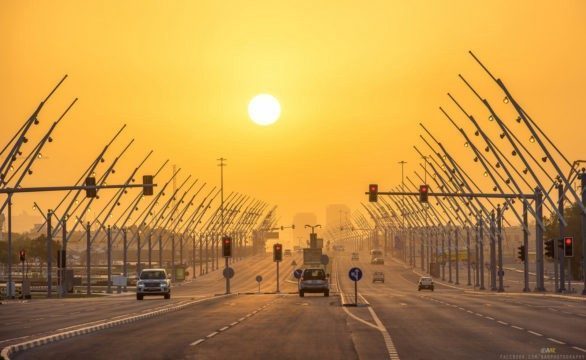
Commuters in Qatar spent an average of 4.5 days on the roads last year, thanks to traffic congestion.
Up seven hours from the year before, the wasted time equates to an economic loss of about QR6 billion, or about 1 percent of the country’s GDP.
That’s according to the Qatar Mobility Innovations Center (QMIC), which released its second annual Qatar Traffic Report this week.
2. Overall #congestion level in all 2016 is slightly worse than 2015 due to active road projects (especially in 1H) & increase in # of cars
— QMIC (@QmicQatar) February 22, 2017
The report tries to quantify the impact traffic jams have on the country using more than a billion data records.
These are collected through QMIC’s network of traffic sensors, cars outfitted with GPS devices and information from users of its iTraffic (Masarak) mobile app.
Worst locations and times
QMIC highlighted several routes that are particularly congested during the morning rush hour.

According to the Gulf Times, they include:
- Al Sadd Intersection-Olympic Roundabout;
- Musheireb Interchange, B Ring Road;
- Onaiza Intersection-Lekhwiya Intersection, Al Markhiya Street;
- Umm Ghuwalina Intersection-Al Sharq Intersection, C-Ring Road; and
- Al Waab Intersection to Al Bustan St.
During the evening, the most congested areas were:
- Environment Roundabout Duhail Intersection, Al Khafji Street;
- To Television Roundabout, Ahmed Bin Ali Street;
- Al Sadd Intersection-Olympic Roundabout, Jawaan Street;
- To Al Waab Intersection, Al Bustan Street; and
- Lejbailat Intersection-Television Roundabout, Al Jamiaa Street.
The worst day of the week for traffic is Sunday mornings, and the most congested month last year was October.
However, traffic jams appeared to improve as the year went on. This suggests that newly completed road projects are starting to help traffic flow, QMIC said.
Three more years
According to the Peninsula, traffic officials sought to reassure residents about the new data, saying conditions are only temporary.

The newspaper quoted Traffic Department chief Brig. Mohammed Saad Al Kharji as saying things would improve within the next three years, after all major road projects are completed.
He added:
“The study is shocking for sure, but I believe the real figures will come when all roads are opened, railway projects commenced and public transport expanded.
We have to be patient for the time being. I used to give an example to explain this situation. For example someone is sick and the doctor told him that he needs surgery and it will take a month for recovery. The patient will undergo the operation and wait for recovery.”
Thoughts?






